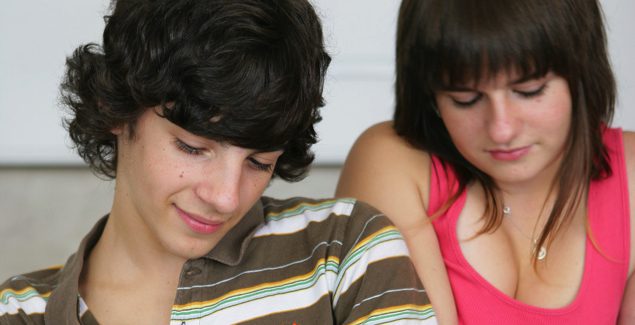The Intense Power Of Love On Our Kids

Posted in: Grade School, Parenting Concerns, Teenagers, Young Adults
Topics: Child + Adolescent Development, Relationships
There was this song that came out when I was 13 years old. It was by Dan Folgelberg, and I played it over and over again on my Pioneer turntable. It went like this:
I learned the chords on my guitar. I hummed it while I rode my bike to and from school. I mouthed the words as I shaved the blond peach-fuzz that was sprouting where a mustache might some day take hold. I was smitten by this song.
The way I figured it, at the pudgy age of 13, there were about 30 different girls in my 7th grade class whom I could easily imagine entirely and without any conflict whatsoever loving until the end of time. Isn’t that funny? It just didn’t matter that much to me which girl I’d be in love with. It was like any girl would do. My love would be absolute and uncompromising, just like in the Dan Folgelberg song.
I was in love with the idea of my being in love.
Here’s another embarrassing revelation: I used to have this thought-experiment that I’d do with my friends when we were at camp. If <insert name of any girl who has currently kidnapped your ability to be rational> was with you, on the shores of a lake like the one we had a camp, under the pine trees and staring at the reflection of the full moon as it painted a silver streak across the water, and if the night were just a little bit chilly, and if we both were startled and tickled to hear the lonesome call of a midnight loon… then there was no earthly way that either of us would be able to resist making out that night. It was as if my friends and I figured that there were these settings, these songs, these perfect scenarios, where the potential for romance, the opportunity to kiss someone, was among the most fundamental laws of nature.
You can see that Valentine’s Day for me, in my dreams, was near epic.
Now I hope I’m a bit wiser, and without question I’m a lot older, but still I have to admit that this love thing doesn’t always add up. I don’t even think it’s supposed to. If it added up, there’d be no Shakespeare or slow dances or gushy texts that today’s teens wish they hadn’t sent. I mean, think of Romeo and Juliet. For goodness sakes, they just met! And they’re going to die for each other? That’s how crazy things can get.
Nevertheless, in honor of Valentine’s Day, and because these elusive subjects are kind of my job, I’d like to try and tackle love.
Our Kids and the Pleasures and Pains of Romance
“Help me,” kids say, “to understand why all this has happened. Why did it feel so totally right and then become so horribly wrong? Why were we so sure when we tried on each other’s glasses and found that we shared the same prescriptions, that we had found, finally a soul mate? And why, WHY, does it hurt so much now that it’s over?”
This stuff, though, doesn’t lend itself to explanation. It never has. In fact, as parents we get ourselves into trouble when we try to explain it to our kids. More on that in a bit, but first, let’s look at the research.
To be sure, there are some pretty cool findings. Much of the academic literature is categorized under the term Affiliative Behavior. For example, there are lots of studies that suggest that the capacity to solve disagreements with a loved one improves the longer you’re together. Well, duh, you might say. You might reasonably conclude that the capacity to resolve disagreements with your romantic interest has to improve with time or else the relationship fizzles and dies. That’s kind of true, but that’s not the punch line.
It turns out that many people in the early phases of romance, what people who study love call “romantic attraction,” have virtually no disagreements.
It is as if the two people who are together are in synch with the universe. The disagreements come later, after the “romantic attraction” progresses towards “romantic attachment.” That’s when the two people who thought they were amazingly in synch find out that they have disagreements. There’s even data to suggest that you can present people who have just fallen for each other with clear examples of where they powerfully disagree, and it’s not just that they choose to ignore these factors. It’s as if these factors never even existed in the first place.
If you think about the pain of a dissolved relationship, this notion of being in synch and then jarringly out of synch makes sense. Being shoved back into the world of individual differences is soul crushing. It’s like losing a piece of yourself, because for that brief, early period of romantic attraction, you lose track of where you end and of where the other person begins. We shrinks could try and warn kids about some of this, but it wouldn’t’ do any good. It’s in our species’ DNA to romantically merge.
Can We Help Our Kids Navigate the World of Love?
Adults, and especially parents, play a super-important role in all of this. There are studies that measure kids’ response to their parents’ attachment to each other and to the kids themselves. You can even measure these attachments by assessing in parents and kids the content of a brain chemical called oxytocin. Though this is way oversimplified, it turns out that the more oxytocin you see for parents in their own relationships and the more oxytocin you see in parent-child relationships, the more likely it is that the kids will themselves enjoy relationships characterized by longevity and the capacity to withstand conflict.
In short, if parents demonstrate how to get along with themselves and with their kids, then their kids are measurably better at getting along romantically.
Still, parents quite understandably often feel flummoxed when they see their own kids under the fickle sway of Cupid’s arrows. If your teen is head over heals for someone, don’t spoil it and tell your little lovebird that it isn’t love. First of all, that’s kind of missing the point. This is a crush. I’ve always thought that we call it a crush because that head over heals feeling literally has the capacity to be soul crushing. Anything that powerful isn’t about to bend to mere logic. If you tell your teen that he’s not in love, or if you insist that her love isn’t real, you probably won’t start an argument. Your son or daughter will just think you’re talking nonsense.
Parents, when your teen is in the midst of all this, just hold onto the side of that ancient roller coaster. Remember that your kid has his or her hands in the air. The rollercoaster is gaining speed, and the ride, by definition, is going to end. You want to be good and steady if and when things go south.
Because, as a rule, most teen romances go south. And that’s not a tragedy. That’s the way of the world.
Teens are practicing romance, and your job as parents is to be there to pick up the pieces and put things back together again. That’s not the same thing as raining on the parade. If that break-up occurs, don’t try to explain it. I know this is shrinky (I’m a shrink, after all), but go with the feeling and not the logic.
Don’t say:
“Listen, son, of course you broke up. This is a teen romance.”
Say something more like:
“I remember when I broke up with my girlfriend. It hurt like hell. Let me know if you want to talk about it.”
And then watch your child for signs of not bouncing back. Remember that most of us survived that heartbreak, but also know that this is a vulnerable time. Check in, empathize, and be available. That’s the best you can do, and that’s actually pretty awesome. That’s what gets the oxytocin flowing for the next go-around.
It’s quite a ride, this love thing. It just doesn’t make all that much sense.
Happy Valentine’s Day. And thanks, Dan Folgelberg.


 Share
Share Tweet
Tweet





